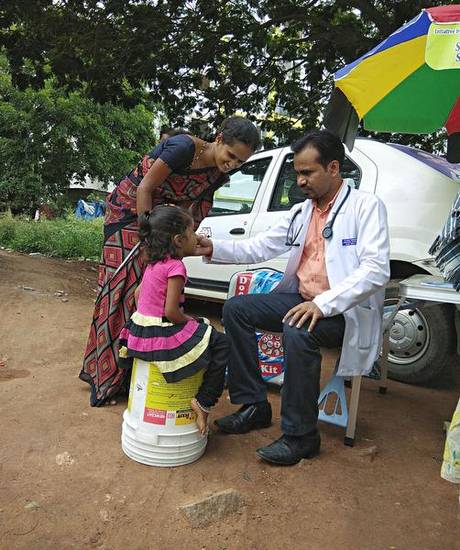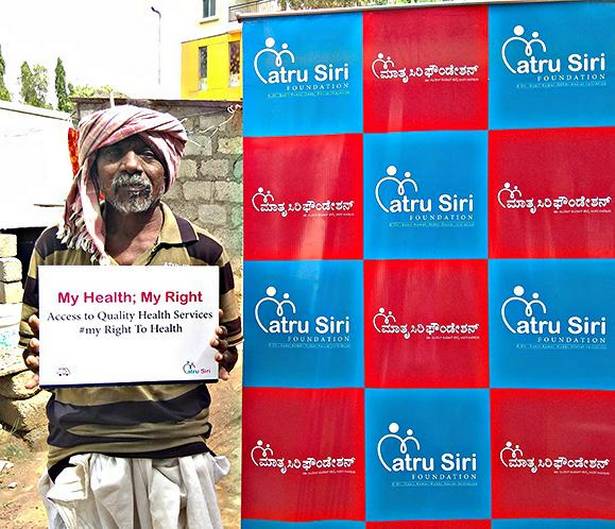Dr Sunil Kumar Hebbi is embarking on a right to health yatra across the country in his mobile car clinic
Dr Sunil Kumar Hebbi’s humanitarian deeds have earned him name and fame. Last month, he was awarded Sri Sathya Sai Award for Human Excellence. Hebbi, however, is not one to rest on his laurels.
After some 700 medical camps across Karnataka and seeing 35,000 patients, he has a new goal in sight — the right to health. In January 2019, the health practitioner is embarking on a health yatra across the country by his car.
“Health is a fundamental human right but is it really so in countries like ours?” Hebbi asks. “According to the National Health Policy 2015, 63 million people face poverty every year. Two million slum children die every year in India. We have one of the highest disease index in the world. What development are we talking about when basic needs such as health is not accessible to people?
Hebbi says Article 21 of the Constitution of India guarantees right to life and education but not health. “A country like Philllipines guarantees right to health to its citizens.”
So, when he travels pan India in his mobile car clinic with just an aide and driver, Hebbi intends to campaign for the right to health. After launching it at the Bengaluru Press Club, Hebbi will go to Kanyakumari from where he will travel to Kashmir by car.
He will go to schools, colleges and universities to spread awareness and also hold medical camps where he will conduct general check-ups.
“Through local activists and NGOs, we are tying up with schools and colleges for venues and the like.
“When we do these check-ups, we will give a health card to people with basic details on it such as blood group, blood pressure, drug allergy, illness, and age.
“These details can come in handy and save time in crisis situations,” says Hebbi, who upon reaching Delhi will hand over a report of his findings collated during the journey to the concerned people in the Ministry of Health.
“We spend 1.25% of our GDP on health but according to WHO, we should be spending 5% of our GDP on health. You make a temple, mosque, anything, I have no issue but also provide us healthcare.”
Born to a farmer in Bijapur, Hebbi was practising on Hosur Road in Bengaluru, until he rescued the life of an accident victim on the road.
“I gave him first aid and took him to hospital. His family called me and said, ‘we want to thank you and feed you’. Their emotions made me realise how badly people need healthcare.”
In 2007, he started Matru Siri Foundation and connected with old age homes, government schools and slums. Since then, every Saturday and Sunday, Hebbi conducts medical camps in these places.
While he treats patients with problems that come under his ambit, patients with serious health concerns or needing surgery are referred to specialised doctors in government hospitals.
Hebbi invites senior doctors to join him voluntarily on the camps. “I first assess the area and the concerns. Once or twice the local MLA has appropriated the camp and made it his show. My doctor friends gave me feedback. We felt disappointed and have tried to steer clear of politicians ever since. We want to make a difference. We are not doing it for effect. Doctors join us voluntarily without any monetary compensation.”
With the help of volunteers, his network of doctors and the money generated from his regular practice, Hebbi says, he manages to run things smoothly. “But even here, I don’t charge more than ₹ 100 to ₹150. I see about 40 to 50 patients daily.”
Health on wheels
Dr. Hebbi’s car operates as a mobile clinic. The project is called Mobile Dr Clinic started in 2010. With a folding chair, table, basic health apparatus and umbrella, Hebbi can set up a temporary clinic anywhere.
source: http://www.thehindu.com / The Hindu / Home> Sci-Tech> Health / by Shailaja Tripathi / December 12th, 2018

